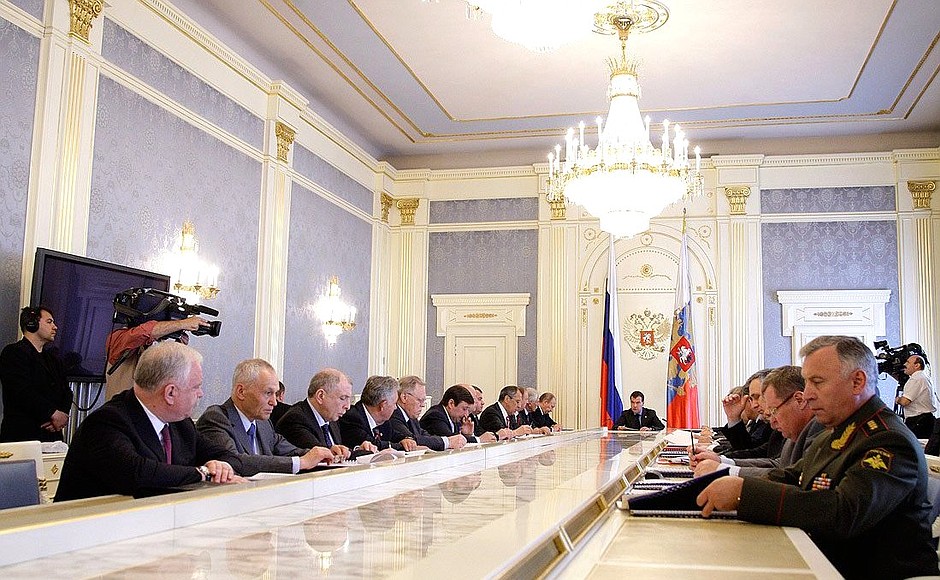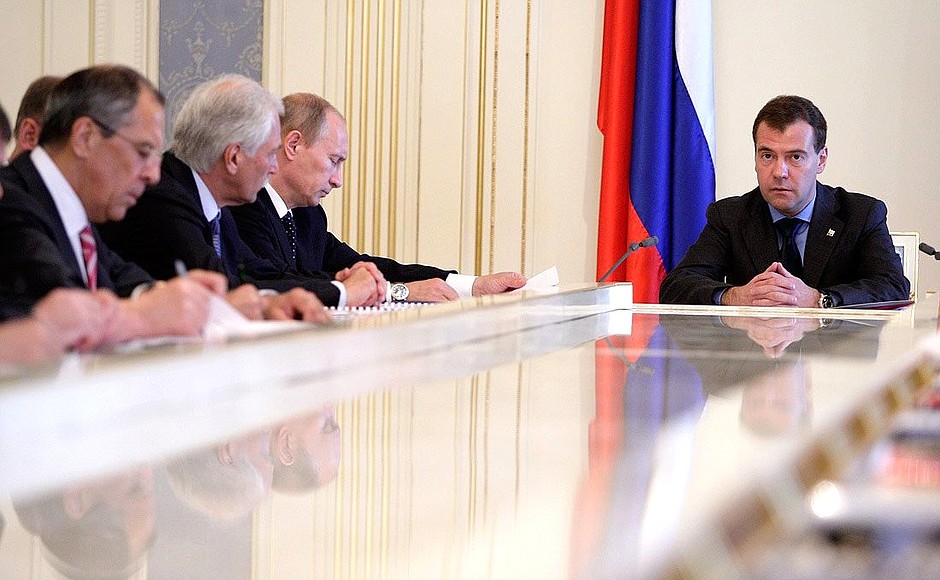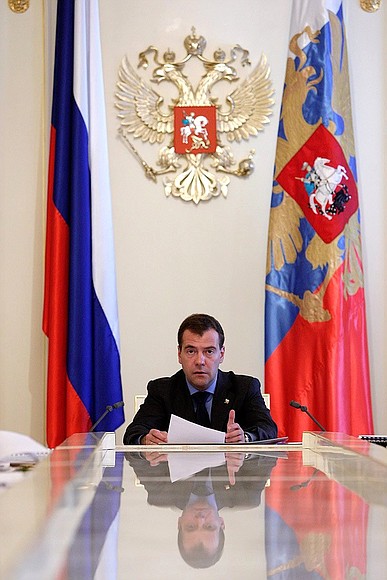The President outlined a number of priorities for the sector, including completing work on the Military Shipbuilding Development Programme, drafting a long-term comprehensive programme for developing the shipbuilding industry, and finalising state support measures for the sector. President Medvedev stressed that state support must be backed up by an increase in labour productivity, more effective use of assets, and cost-cutting efforts in the industry.
Mr Medvedev also said that setting the shipbuilding industry on an innovative development track requires closely coordinated efforts between the federal agencies and the integrated enterprises set up in the sector.
* * *
President of Russia Dmitry Medvedev: Colleagues, we are looking at shipbuilding today and are here to discuss our shipbuilding industry’s development outlook. Given this sector’s importance and the big role it has always played in this country, we are discussing it in the Security Council, precisely because we hope that Russia was and always will be a leading sea power. Having a modern navy is absolutely essential to our country’s development. Of course, modern ships are essential not just to ensure our military security but also play an absolutely vital role in ensuring food and energy security too.
Today we will talk about the situation thus far and look at our future objectives. For many decades, especially in the twentieth century, our country had the extensive scientific and industrial base it needed to develop the shipbuilding industry. This included unique technology in the areas of nuclear-powered vessels and submarines. Unfortunately, we all know that the 1990s threw the industry into crisis, and now we are making strenuous efforts to get the sector back on its feet.
In terms of cost and quality it became more profitable to build civilian vessels abroad. Foreign shipyards secured multimillion-dollar contracts while our own shipyards stood idle. Thus deprived of funds, the sector lost experienced specialists and was unable to carry out modernisation. Some progress has been made over recent years. In 2007, the United Shipbuilding Corporation was established, integrating a number of enterprises in the sector. The corporation’s CEO briefed me just before on the current state of affairs.
Over the crisis period almost 22 billion rubles [$700 million] in budget funds were allocated to the sector. This helped to keep many enterprises afloat. Last year, compared to 2008 (and remembering that 2009 was a difficult year) the sector’s output increased by almost a quarter. The measures taken last year were mostly stabilisation measures. They were necessary steps, but they are not enough to get normal work in the sector underway, not to mention making real advances and restoring our possibilities in this industry.
Meeting our domestic market’s demands and expanding our exports will require more intensive technological modernisation in the sector. We need to draft a clear and coherent long-term policy in this area, a policy resolving several priority objectives, which I will name now.
First, we need to complete work on the programme to develop naval shipbuilding. This programme must give a clear list of the promising models we will develop and outline the specific measures and deadlines for carrying out these projects. It must also provide for the necessary financing as part of the State Arms Procurement Programme for 2011–2020, and a number of Federal Targeted Programmes.
I remind you that I have already issued instructions on improving the procedures for carrying out state defence procurement programmes, setting prices for military goods, and concluding contracts for the production of these goods.
Second, by the end of this year we need to draft a long-term comprehensive programme for developing shipbuilding. This programme must take into account the whole combination of factors affecting the sector’s development, including the international competition environment. There is no hiding here. In everything we do we will be in quite fierce market competition with other suppliers of these kinds of goods.
A separate issue to address is that of the recently toughening competition for Arctic resources. This programme therefore needs to have a strategic dimension and encompass not just the military but also civilian shipbuilding sectors. It should also set out the promising range of sea and river vessels that can be produced here in Russia. In other words, we need to work out exactly what we can and cannot do, and draw up the list of modern breakthrough technology the shipbuilding industry needs. We need to decide what we absolutely must produce here, for security reasons too, and what we can purchase abroad.
Of course, it is always better to have one’s own know-how, but we realise that it is not always so easy to do everything ourselves. Often this can prove a long and costly process, and so we also need to engage in design and production cooperation with our partners abroad.
Third, our strategic planning also needs to finalise the state support measures for the sector. I want to stress that these support measures must be backed up by increasing labour productivity, as we have discussed before, more effective use of assets, and cost-cutting efforts in the sector. Excessive costs, unfortunately, are the bane that destroy even the best projects and make many production facilities simply uncompetitive. How can we possibly compete with foreigners when our shipyards are several times more labour-intensive than those abroad? We realise that this is the legacy of the years of collapse, but we must do something about it. Constantly repeating that we lost everything in the 1990s, and that’s why it is such hard going now, and why we have such high costs, and so you have to help by buying our products, won’t work anymore. We need our enterprises to be competitive in terms of cost and production deadlines. I want the reports to pay particular attention to these matters.
Finally, I note too that we cannot get the shipbuilding industry onto an innovative development track without closely coordinating the efforts of the federal agencies and the integrated enterprises we have established in this sector. Uncoordinated and ineffective use of budget funds and delays in carrying out decisions must be punished. We need to look at the way tenders are organised, and the way contracts for supply of ships and vessels for state needs are concluded, and we also need to check into cases of misappropriation of budget funds.


